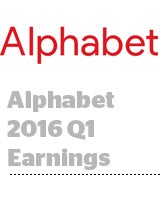In the first quarter of 2016, Alphabet reported total advertising revenues of $18 billion, representing a 16% increase from the same period last year, though slightly below analyst expectations.
Google CFO Ruth Porat, speaking on the company’s quarterly conference call after trading on Thursday, attributed the growth to the company’s mobile search business.
Today’s earnings report is only the second Alphabet has conducted in which it separated Google and its ad business from the rest of the company. Many of Alphabet’s “moonshots,” like virtual reality, driverless cars and its Nest connected home business, don’t meaningfully impact revenue, but investors have begun to look at those units’ operating costs as a potential drag on growth.
Google CEO Sundar Pichai looked to assuage such concerns by reminding investors that YouTube, which continued its years-long acceleration, “seemed like a moonshot a decade ago.”
The company stock has worked itself back from a steep drop in value during the first week of February, as concerns cropped up over the long-term health of desktop search and mobile web ads. Alphabet stock also fell more than 5% in after-hours trading.
One discouraging statistic was aggregate price-per-click, the amount a publisher gets per successful marketing action, which declined by 9% (against an expected drop of 5.8%). On the other hand, overall paid clicks, which Google hopes will increase in mobile enough to counterbalance the decline in price-per-click, are up almost 30% YoY.
Both Pichai and Porat noted rising traffic acquisition costs (TAC) as a structural hurdle to its programmatic business, affecting both Google and its network members, where TAC rose from 68% of advertising revenue at this time last year to 70% now.
This week Google also faces a new EU regulatory case, alleging anti-competitive practices stemming from its Android platform. Google general counsel Kent Walker responded to the inquiry in a company blog post. The company didn’t address its regulatory disputes during the earnings report.













